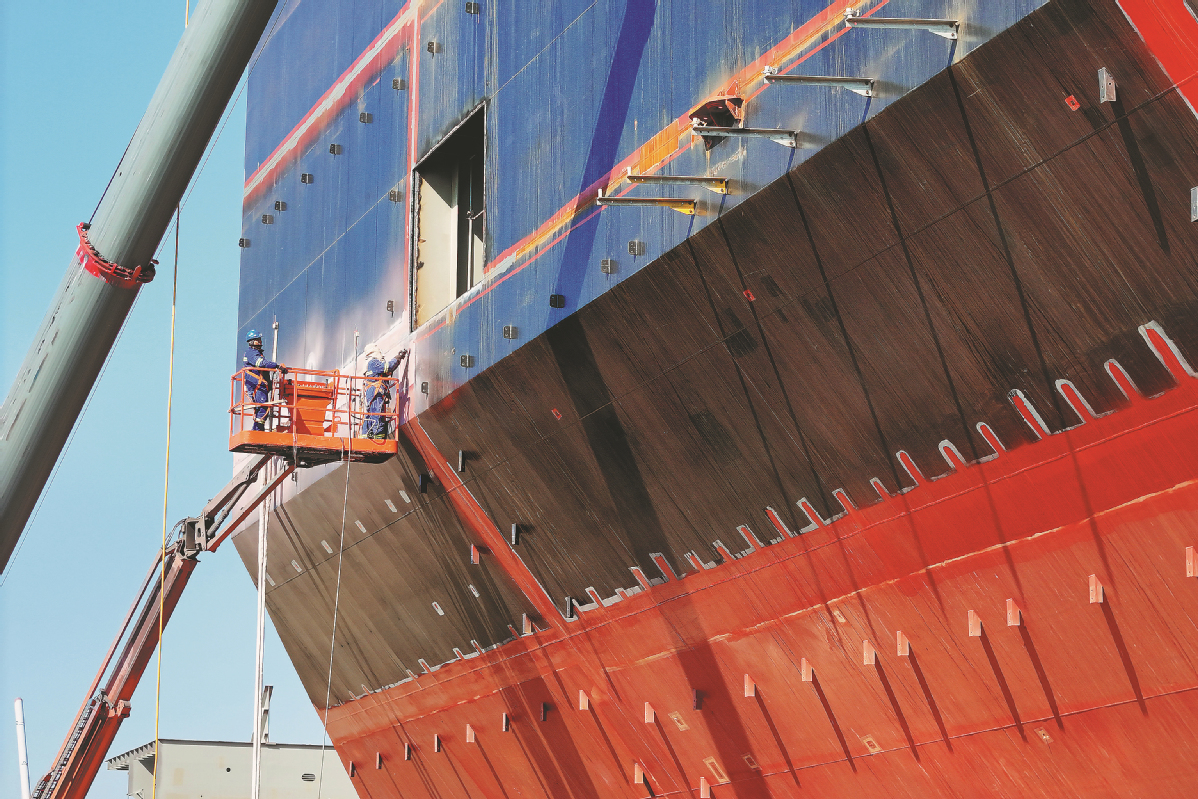Shipbuilders riding crest of global orders
China's complete manufacturing clusters, sustained investment and resource allocation boost industry


Multiple teams tasked with simultaneously constructing 14 ships, each with different functions, are busy at work at the docks owned by Jiangsu Yangzi Xinfu Shipbuilding Co Ltd, a shipyard based in Taizhou, East China's Jiangsu province.
The company receives large shipments of various commodities and industrial equipment daily, including marine steel, fasteners, electronic components and aluminum alloy.
However, most of the oil and chemical tankers, dual fuel-powered container ships and ore carriers built in the shipyards will not be delivered to domestic shipping and energy companies.
Instead, they will go to shipowners in Norway, Greece, Denmark and Singapore, who have placed orders with the shipyard's parent company — Yangzijiang Shipbuilding Group, a Jingjiang, Jiangsu province-based firm — over the past two years.
"About 77 percent of our orders are LNG (liquefied natural gas)-powered container ships, dual fuel-powered vessels and diesel-electric propulsion ships, with orders on hand already scheduled through 2027 and the latest delivery extending into 2028," said Liu Yinjun, assistant president of Jiangsu Yangzi Xinfu Shipbuilding.
At the company's training center, workers are receiving training in welding and bonding operations, preparing them technically for the construction of two 175,000-cubic-meter LNG carriers. These advanced vessels are top-tier assets in the global shipbuilding industry, historically dominated by South Korean shipbuilders, and often referred to as the pinnacles of excellence.
Highlighting that Chinese shipbuilders have continuously overcome technical challenges and secured international orders, Liu said only five companies in China are capable of building LNG carriers, and his firm is the only privately owned shipbuilding company among these.
Thanks to China's complete manufacturing clusters, strong upstream and downstream industries, as well as continued investment and resource allocation in the shipbuilding sector, the country's shipbuilding output reached 42.32 million deadweight tons in 2023, a year-on-year increase of 11.8 percent, data from the Ministry of Industry and Information Technology showed. The output accounted for 50.2 percent of the global total.
With improved global competitiveness, Chinese shipyards saw new orders surge 56.4 percent year-on-year to 71.2 million dwt last year, accounting for 66.6 percent of the global total.
Li Yanqing, secretary-general of the Beijing-based China Association of the National Shipbuilding Industry, or CANSI, said the country achieved a leading position in the global shipbuilding market by securing new orders for 14 out of 18 major ship types in 2023.
This not only solidified China's leading position in key segments, capturing more than 70 percent of the worldwide total for new bulk carrier and oil tanker orders, but also showcased the country's expertise in niche markets, as new orders for car carriers exceeded 80 percent of the global share.
Anticipating a significant surge in profitability for China's shipbuilding industry in 2024, Li said that with market prices in 2023 having risen by over 10 percent compared to the previous year, and reaching as high as 15 percent in many instances, there is strong reason to believe that the industry is poised to touch unprecedented levels of financial success in the years ahead.
With the second large cruise ship being built locally at China State Shipbuilding Corp's Shanghai Waigaoqiao Shipbuilding Co Ltd in Shanghai, and a large number of vessels being assembled in the Yangtze and Pearl River Delta regions, the next two years will be a peak period for Chinese shipbuilding firms, marked by the delivery of various vessels, notably high-tech ones such as large LNG carriers and mega container ships, said Zeng Ji, a professor of shipbuilding at Shanghai Maritime University.
In addition to holding orders to build 13 LNG carriers for different shipowners, including eight ordered by China Merchants Energy Shipping Co Ltd, Dalian Shipbuilding Industry Co Ltd said earlier this year that it had sealed a number of new ship deals, with the total order value amounting to around 15 billion yuan ($2.08 billion). Dalian Shipbuilding Industry Co Ltd is a subsidiary of State-owned CSSC, and is based in Dalian, Northeast China's Liaoning province.
The proportion of these high-tech, high value-added projects in the backlog of orders has significantly increased. It will have a fairly positive impact on the overall profitability of the shipyard, forming a new growth point, said Fu Wei, deputy director at the marketing department of Dalian Shipbuilding Industry Co Ltd.
CANSI has forecast that the global shipbuilding completion volume will remain at a historically high level of 100 million dwt in 2024, with new orders expected to be between 80 million and 100 million dwt and the volume of orders on hand remaining above 200 million dwt.
China's shipbuilding completion volume is expected to be around 45 million dwt, with new orders of around 55 million dwt this year, and orders on hand above 130 million dwt, according to CANSI.


















